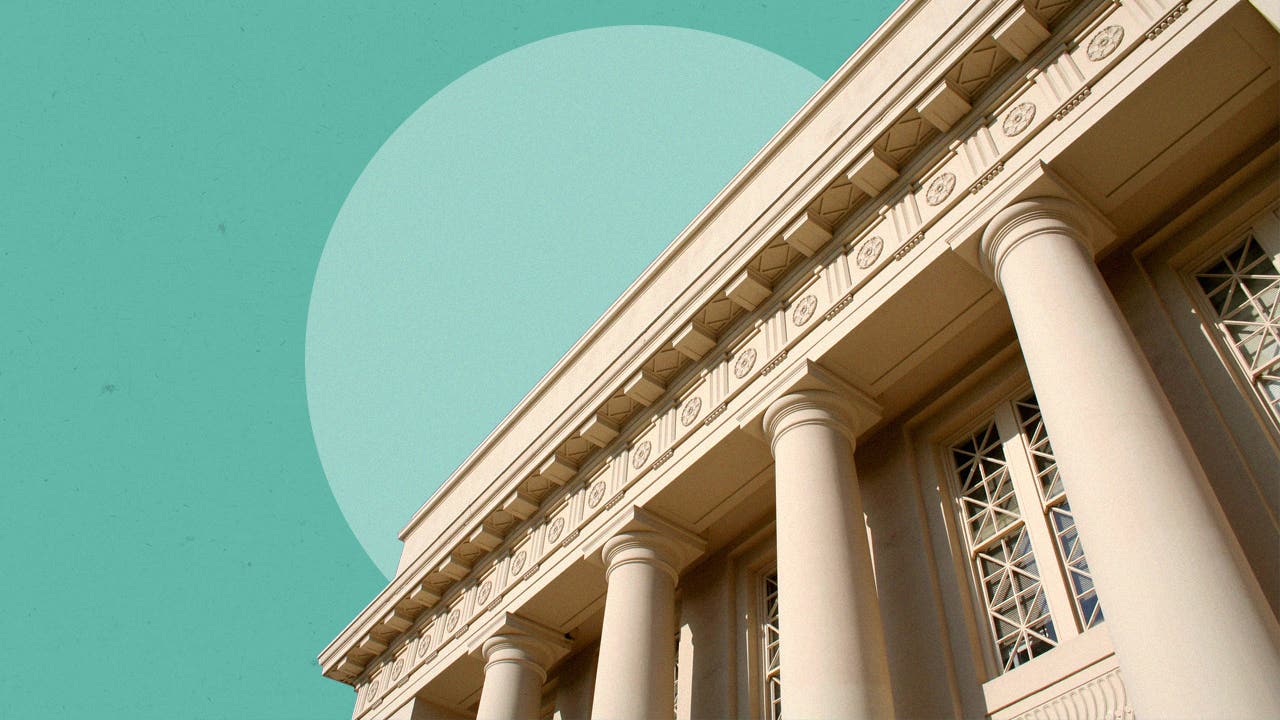These are the 15 largest banks in the US

The 15 largest consumer banks held a combined total of around $12 trillion in domestic assets as of June 2025. That means that a lot of people and businesses are keeping their money with a big bank. That could be in part because with a big bank, you’ll likely get access to a wide product variety and in-person banking services at a large branch network.
These are the biggest banks in the U.S. by their domestic assets, according to the latest numbers from the Federal Reserve. We don’t include investment or business-only banks on this list.
| RANK | BANK NAME | TOTAL DOMESTIC ASSETS AS OF JUNE 30, 2025 |
|---|---|---|
| 1 | JPMorgan Chase | $2.7 trillion |
| 2 | Bank of America | $2.5 trillion |
| 3 | Citigroup | $1.09 trillion |
| 4 | Wells Fargo | $1.73 trillion |
| 5 | U.S. Bancorp | $663.6 billion |
| 6 | Capital One Financial | $648.4 billion |
| 7 | Goldman Sachs | $523.6 billion |
| 8 | PNC Financial Services | $549.7 billion |
| 9 | Truist | $535.5 billion |
| 10 | TD Bank | $356.4 billion |
| 11 | BMO | $253.7 billion |
| 12 | Morgan Stanley Bank NA | $239.2 billion |
| 13 | Morgan Stanley Private Bank | $235 billion |
| 14 | First Citizens Bank | $229.3 billion |
| 15 | Citizens Bank | $217.9 billion |
1. JPMorgan Chase
Chase Bank is the consumer banking division of JPMorgan Chase. It has more branches than any other bank in the U.S., including in all 48 contiguous states.
- Assets: $2.76 trillion
- ATMs: more than 15,000
- Branches: over 4,900
- Read Bankrate’s review of Chase Bank
2. Bank of America
Bank of America serves about 70 million consumers and small business clients worldwide. Like many of the biggest banks, it offers robust digital tools that include a versatile mobile app.
- Assets: $2.5 trillion
- ATMs: about 15,000
- Branches: about 3,700
- Read Bankrate’s review of Bank of America
3. Citigroup
Citigroup is a global financial services corporation. It has a presence in nearly 180 jurisdictions and countries. In addition to deposit bank accounts, Citi offers wealth management, loans and credit cards, among other services.
- Assets: $1.09 trillion
- ATMs: more than 65,000
- Branches: over 650
- Read Bankrate’s review of Citibank
4. Wells Fargo
Wells Fargo has been around for a long time: it was founded in 1852. The bank has gotten into regulatory trouble in the past and is focusing on repairing its fractured relationship with customers after a series of missteps. In June 2025, the Federal Reserve removed the asset growth restriction the bank had been under since 2018.
- Assets: $1.73 trillion
- ATMs: more than 11,000
- Branches: over 4,100
- Read Bankrate’s review of Wells Fargo
5. U.S. Bancorp
U.S. Bancorp is the bank holding company and parent company of U.S. Bank, which began life in 1863 as the First National Bank of Cincinnati. U.S Bank has branches in more than half of the 50 states.
- Assets: $663.6 billion
- ATMs: more than 40,000
- Branches: over 2,000
- Read Bankrate’s review of U.S. Bank
6. Capital One Financial
Capital One is a Fortune 500 company with subsidiaries that include Capital One Bank. In addition to branches, Capital One bank customers in select cities have access to Capital One Cafés, which are coffee shops with free Wi-Fi where visitors can open accounts and attend financial workshops.
- Assets: $648.4 billion
- ATMs: more than 70,000
- Branches: over 250
- Read Bankrate’s review of Capital One
7. Goldman Sachs
Goldman Sachs is a global investment banking, management and securities firm. Its clients have access to a variety of financial services, including banking products through Marcus, its online banking arm that made its debut in fall 2016.
- Assets: $523.6 billion
- ATMs: N/A, Marcus does not offer debit cards.
- Branches: 5
- Read Bankrate’s review of Marcus by Goldman Sachs
8. PNC Financial Services
PNC was founded as Pittsburgh Trust and Savings Co. in 1845. Today, the bank has locations in 28 states and Washington, D.C.
- Assets: $549.7 billion
- ATMs: about 60,000
- Branches: about 2,300
- Read Bankrate’s review of PNC Bank
9. Truist Financial
Truist is the bank formed by the merger of BB&T and SunTrust. The two banks together have more than 275 years of combined history. Truist has branches in 17 states and Washington D.C. and serves 15 million clients.
- Assets: $535.5 billion
- ATMs: more than 3,000
- Branches: over 1,900
- Read Bankrate’s review of Truist Bank
10. TD Bank
TD Bank is the U.S. commercial banking arm of Canada’s TD Bank Group. Customers have access to mortgages, deposit accounts, credit cards and products for commercial and small business clients. The bank mostly has its branches along the East Coast.
- Assets: $356.4 billion
- ATMs: around 2,600
- Branches: 1,100
- Read Bankrate’s review of TD Bank
11. BMO
BMO is both a personal and commercial bank in the US but has its roots in Canada (as the Bank of Montreal). In the US, it provides credit cards, loans, mortgages and investing products in addition to deposit accounts.
- Assets: $253.7 billion
- ATMs: 40,000
- Branches: about 1,000
- Read Bankrate’s review of BMO
12 and 13. Morgan Stanley Bank NA and Morgan Stanley Private Bank
Morgan Stanley was founded in 1935 and now operates in more than 40 countries. Morgan Stanley currently does business as two FDIC-insured banks: Morgan Stanley Private Bank, National Association (MSPBNA) and Morgan Stanley Bank, N.A. (MSBNA). Part of the reason the bank does this is it allows it to offer higher federal insurance deposit limits to its customers. In 2020, Morgan Stanley completed the acquisition of E-Trade and provides consumer bank accounts through that entity.
- Assets: $239.2 billion and $235 billion, respectively
- ATMs: N/A; customers get unlimited ATM fee reimbursements (domestically)
- Branches: 0
- Read Bankrate’s review of E*TRADE by Morgan Stanley Private Bank
14. First Citizens Bank
First Citizens Bank has been around for more than 125 years and offers services for personal, business and commercial banking as well as wealth management. It has branches in 22 states, with the biggest presence in the Carolinas.
- Assets: $229.3 billion
- ATMs: at least 500
- Branches: over than 500
- Read Bankrate’s review of First Citizens Bank
15. Citizens Bank
Citizens Bank dates its history to 1828 in Rhode Island and currently has branches in 14 states and Washington D.C. It offers banking services to a broad range of customers, including individual consumers, small business and large corporations.
- Assets: $217.9 billion
- ATMs: more than 2,250
- Branches: over 960
- Read Bankrate’s review of Citizens Bank
Pros and cons of large banks
Large banks often afford the conveniences of large branch and ATM networks, and sometimes generous sign-up bonuses, but they often charge lots of fees and pay low rates on savings accounts.

Pros
- Brick-and-mortar locations
- ATMs that are convenient to you
- Large variety of bank account or lending products to choose from
- Often offer bank account bonuses

Cons
- Low yields on savings and certificates of deposit (CDs)
- Often charge fees, such as monthly service and overdraft fees, that online-only banks don’t
Are bank account bonuses at large banks worth switching banks?
A bank account bonus can be a reason to switch banks, but generally banking is a long-term relationship. Checking account holders keep a checking account for an average of 19 years, according to Bankrate’s latest Checking Account Survey. But you have to do the math: sometimes a high-yield savings account for your savings will end up being a better deal than a bank account bonus at a brick-and-mortar bank. Use a compound interest calculator to see what you could earn in a high-yield savings account with your money instead of using it for a bonus.
But a bank account bonus at a bank insured by the Federal Deposit Insurance Corp. (FDIC) that’s offering a competitive yield is an offer that you should consider since they’re not available often.
Branch and ATM networks of major banks
One of the biggest perks of large banks is that they generally have large ATM and branch networks. This can be useful if you’re a big ATM user or have complex banking needs. But it’s crucial to note that online-only banks can also have very large ATM networks, usually by partnering with third-party ATM companies like MoneyPass.
Having access to a large fee-free ATM network is beneficial since ATM fees can be costly. The average total out-of-network ATM fee is $4.86, according to Bankrate’s 2025 checking account and ATM fee study. When deciding on a new bank, look for one that has convenient fee-free ATMs near you or will reimburse some or even all out-of-network fees that another bank charges you for using its ATM.
Bottom line
The 15 largest banks in the US hold trillions of dollars in assets. These banks offer a variety of services in addition to just bank accounts and have a wide reach through their branch and ATM networks.
Why we ask for feedback Your feedback helps us improve our content and services. It takes less than a minute to complete.
Your responses are anonymous and will only be used for improving our website.







